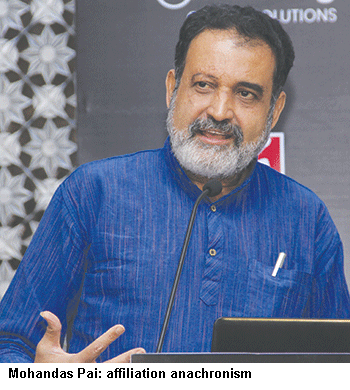 A chartered accountant and law alum of Bangalore University, T.V. Mohandas Pai, former chief financial officer of IT behemoth Infosys Ltd, is a venture capitalist, seer and chairman of the Bangalore-based Manipal Global Education Services and a well-known champion of education reform.
A chartered accountant and law alum of Bangalore University, T.V. Mohandas Pai, former chief financial officer of IT behemoth Infosys Ltd, is a venture capitalist, seer and chairman of the Bangalore-based Manipal Global Education Services and a well-known champion of education reform.
How satisfied are you with the Rs.85,010 crore provision made for education in the Union Budget 2018-19, of which a major share — Rs.49,530 crore — has been allocated for higher education?
Not satisfied. This is a maintenance budget, without focus on quality or research or taking a transformational path. In higher education, it is focused only on Central government institutions. A budget of the Central government for Central government institutions is not a budget for the students of India.
Not even one of India’s 800 universities is ranked among the Top 200 World University Rankings of the London-based ranking agencies QS and Times Higher Education. What are your Top 5 priorities for remedying this dismal situation?
My suggestions, for what they are worth, are:
• Full autonomy for Top 200 universities.
• A non-lapsable research fund of Rs.5,000 crore to ensure research can be funded on a competitive basis for all institutions without discrimination.
• Green light for Top 500 global universities to come to India and educate out of here.
• Separating affiliation from universities and establishing more unitary universities.
• A massive programme to fund students to get educated in Top 200 global universities.
The low international ranking of India’s higher education institutions is to a great extent attributable to the under-preparedness of school-leavers for higher education. What in your opinion are urgent reforms required in K-12 education?
• Focus on quality.
• Allow the top 20 percent schools full freedom to expand their operations and establish greenfield campuses.
• Introduce a voucher system so poor students can get education in schools of their choice.
• Consolidate government schools under village panchayats from classes I-XII so that schools can be larger and better.
• Invest massively in technology to improve learning outcomes.
• Establish district school education committees to supervise school operations and improve learning outcomes.
How realistic is it to hope that the Indian economy will realise its demographic dividend in the near or medium-term future?
The time is past for reaping our demographic dividend. Now, the focus should be on containing the looming demographic disaster caused by under-investment and neglect of education during the past 70 years.